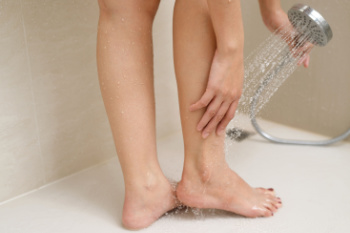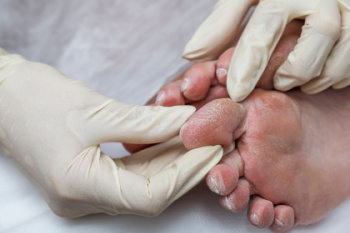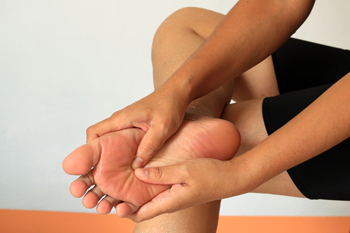
Taking care of your feet is essential for overall health and mobility. Washing them daily with warm water and mild soap helps prevent infections and removes dirt and sweat buildup. Moisturizing regularly keeps the skin soft and prevents dryness or cracking. Wearing properly fitted shoes with adequate support reduces pressure on the feet and minimizes discomfort. Proper toenail trimming is also important, as cutting nails straight across and avoiding cutting them too short helps prevent ingrown toenails. Regularly inspecting the feet for any cuts, blisters, or changes in skin texture can help detect potential problems early. Additionally, stretching and strengthening exercises improve circulation and foot flexibility. If you have developed any type of foot condition, it is suggested that you promptly contact a podiatrist who can offer effective treatment solutions, and guide you on additional everyday foot care tips.
Everyday foot care is very important to prevent infection and other foot ailments. If you need your feet checked, contact Mohammad R. Parsa, DPM from Madison Foot Clinic. our doctor can provide the care you need to keep you pain-free and on your feet.
Everyday Foot Care
Often, people take care of their bodies, face and hair more so than they do for their feet. But the feet are a very important aspect of our bodies, and one that we should pay more attention to. Without our feet, we would not be able to perform most daily tasks.
It is best to check your feet regularly to make sure there are no new bruises or cuts that you may not have noticed before. For dry feet, moisturizer can easily be a remedy and can be applied as often as necessary to the affected areas. Wearing shoes that fit well can also help you maintain good foot health, as well as making it easier to walk and do daily activities without the stress or pain of ill-fitting shoes, high heels, or even flip flops. Wearing clean socks with closed shoes is important to ensure that sweat and bacteria do not accumulate within the shoe. Clean socks help to prevent Athlete’s foot, fungi problems, bad odors, and can absorb sweat.
If you have any questions please feel free to contact our office located in Madison, MS . We offer the newest diagnostic and treatment technologies for all your foot and ankle needs.

Caring for your feet is essential if you have diabetes, as poor circulation and nerve damage can lead to serious complications. Check your feet every day for cuts, blisters, or swelling, even if they feel fine. Wash them with warm water and mild soap, then dry thoroughly, especially between the toes. Keep your skin moisturized to prevent cracks, but avoid putting lotion between the toes, as excess moisture can lead to infections. Wear comfortable, well-fitted shoes and soft, non-restrictive socks to protect against pressure points and irritation. Never walk barefoot, even at home, to reduce the risk of injury. Avoid soaking your feet for long periods of time, as this can weaken the skin. If you notice any pain, redness, or wounds that are not healing, it is suggested that you see a podiatrist to prevent complications before they become serious.
Diabetic foot care is important in preventing foot ailments such as ulcers. If you are suffering from diabetes or have any other concerns about your feet, contact Mohammad R. Parsa, DPM from Madison Foot Clinic. our doctor can provide the care you need to keep you pain-free and on your feet.
Diabetic Foot Care
Diabetes affects millions of people every year. The condition can damage blood vessels in many parts of the body, especially the feet. Because of this, taking care of your feet is essential if you have diabetes, and having a podiatrist help monitor your foot health is highly recommended.
The Importance of Caring for Your Feet
- Routinely inspect your feet for bruises or sores.
- Wear socks that fit your feet comfortably.
- Wear comfortable shoes that provide adequate support.
Patients with diabetes should have their doctor monitor their blood levels, as blood sugar levels play such a huge role in diabetic care. Monitoring these levels on a regular basis is highly advised.
It is always best to inform your healthcare professional of any concerns you may have regarding your feet, especially for diabetic patients. Early treatment and routine foot examinations are keys to maintaining proper health, especially because severe complications can arise if proper treatment is not applied.
If you have any questions please feel free to contact our office located in Madison, MS . We offer the newest diagnostic and treatment technologies for all your foot and ankle needs.

Ball of the foot pain, medically known as metatarsalgia, often develops gradually and affects the area between the arch and toes, particularly around the metatarsal bones. Common symptoms of ball of the foot pain include a sharp, burning pain or the sensation of stepping on small stones. Some patients also experience numbness or tingling in the toes. Symptoms typically intensify with prolonged standing, walking, running, or when participating in high-impact sports like jumping. Wearing ill-fitting footwear, especially shoes that are too tight, too loose, or lack proper cushioning, can significantly contribute to discomfort. High heels frequently shift extra weight onto the front of the foot, further aggravating symptoms. Additionally, foot abnormalities such as high arches, longer second toes, bunions, or hammertoes increase susceptibility. For persistent discomfort, a podiatrist can assess your condition, perform diagnostic tests like X-rays or MRI scans, and provide customized treatment options, potentially including orthotics or surgery. If you experience ongoing pain in the ball of your foot, it is suggested that you schedule an appointment with a podiatrist for an exam, diagnosis, and treatment.
Foot Pain
Foot pain can be extremely painful and debilitating. If you have a foot pain, consult with Mohammad R. Parsa, DPM from Madison Foot Clinic. our doctor will assess your condition and provide you with quality foot and ankle treatment.
Causes
Foot pain is a very broad condition that could be caused by one or more ailments. The most common include:
- Bunions
- Hammertoes
- Plantar Fasciitis
- Bone Spurs
- Corns
- Tarsal Tunnel Syndrome
- Ingrown Toenails
- Arthritis (such as Gout, Rheumatoid, and Osteoarthritis)
- Flat Feet
- Injury (from stress fractures, broken toe, foot, ankle, Achilles tendon ruptures, and sprains)
- And more
Diagnosis
To figure out the cause of foot pain, podiatrists utilize several different methods. This can range from simple visual inspections and sensation tests to X-rays and MRI scans. Prior medical history, family medical history, and any recent physical traumatic events will all be taken into consideration for a proper diagnosis.
Treatment
Treatment depends upon the cause of the foot pain. Whether it is resting, staying off the foot, or having surgery; podiatrists have a number of treatment options available for foot pain.
If you have any questions, please feel free to contact our office located in Madison, MS . We offer the newest diagnostic and treatment technologies for all your foot care needs.

